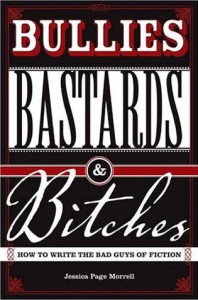
Bullies, Bastards & Bitches
How to Write the Bad Guys of Fiction
by Jessica Page Morrell
Writer’s Digest Books, 2008
ISBN 978-1-58297-484-2
$16.99 paperback, 304 pages
- Here are some general differences between a hero and an anti-hero, and how an anti-hero is the antithesis of a traditional hero from:
- A hero is an idealist.
- An anti-hero is a realist.
- A hero has a conventional moral code.
- An anti-hero has a moral code that is quirky and individual.
- A hero is somehow extraordinary.
- An anti-hero can be ordinary.
- A hero is always proactive and striving.
- An anti-hero can be passive.
- A hero is often decisive.
- An anti-hero can be indecisive or pushed into action against his will.
- A hero is a modern version of a knight in shining armor.
- An anti-hero can be a tarnished knight, and sometimes a criminal.
- A hero succeeds at his ultimate goals, unless the story is a tragedy.
- An anti-hero might fail in a tragedy, but in other stories he might be redeemed by the story’s events, or he might remain largely unchanged, including being immoral.
- A hero is motivated by virtues, morals, a higher calling, pure intentions, and love for a specific person or humanity.
- An anti-hero can be motivated by a more primitive, lower nature, including greed or lust, through much of the story, but he can sometimes be redeemed and answer a higher calling near the end.
- A hero is motivated to overcome flaws and fears, and to reach a higher level. This higher level might be about self-improvement, a deeper spiritual connection, or trying to save humankind from extinction. His motivation and usually altruistic nature lends courage and creativity to his cause. Often, a hero makes sacrifices in the story for the better of others.
- An anti-hero, while possibly motivated by love or compassion at times, is most often propelled by self-interest.
- A hero (usually when he is the star of the story in genre fiction, such as Westerns) concludes the story on an upward arc, meaning he’s overcome something from within or has learned a valuable lesson in the story.
- An anti-hero can appear in mainstream or genre fiction, and the conclusion will not always find him changed, especially if he’s a character in a series.
- A hero always faces monstrous opposition, which essentially makes him heroic in the first place. As he’s standing up to the bad guys and troubles the world hurls at him, he will take tremendous risks and sometimes battle an authority. His stance is always based on principles.
- An anti-hero also battles authority and sometimes go up against tremendous odds, but not always because of principles. His motives can be selfish, criminal, or rebellious.
- A hero simply is a good guy, the type of character the reader was taught to cheer for since childhood.
- An anti-hero can be a bad guy in manner and speech. He can cuss, drink to excess, talk down to others, and back up his threats with fists or a gun, yet the reader somehow sympathizes with or genuinely likes him and cheer him on.
- A hero can be complex, but he is generally unambivalent; an anti-hero is a complicated character who reflects the ambivalence of many real people.
- An anti-hero’s actions and ways of thinking demand that the reader think about issues and ask difficult questions.
Hope you will take some time to reflect on whether you can punch up your story by creating nuanced, three-dimensional bad guys who are indispensable to your story. I’m going to add this book to my book shelf.
Talk tomorrow,
Kathy
Filed under: Advice, Book, demystify, reference, writing, Writing Tips Tagged: Bullies Bastards & Bitches, Jessica Page Morrell, Writer's Digest Books



This is a good book and is on my shelf, but I need to spend more time with it. Thanks for the reminder to pull it down and get further into it.
I am SO tempted to read this one, as are so many “how-to” books on writing. I already have so many I need to read *sigh* I really do love, though, lists like this which clearly state the essentials in a bare-bones kind of way. Thanks, Kathy!